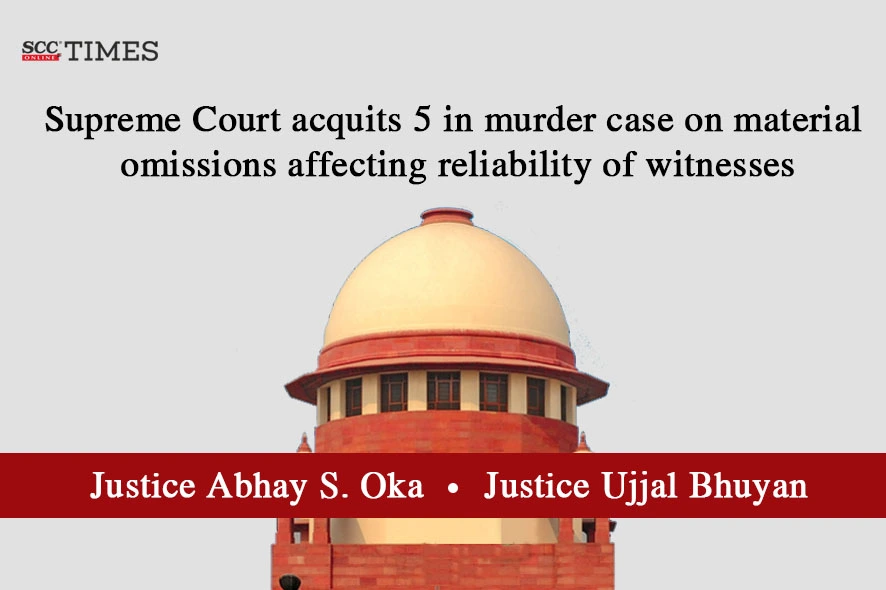Supreme Court: In a criminal appeal against the Gauhati High Court’s decision, confirming the Trial Court’s decision convicting the present appellant persons (‘convicted persons’), for offences punishable under Section 302 read with Section 149 of the Penal Code, 1860 (‘IPC’), the Division Bench of Abhay S. Oka* and Ujjal Bhuyan, JJ. allowed the appeal and set aside the impugned decisions. The Court acquitted the convicted persons of all the charges against them.
The prosecution’s case was that one of the convicted persons picked up the deceased from his residence on the date of the incident and took him to Bhojkhowa Chapori Bazar and killed him by assaulting him with a sharp weapon. The convicted persons were found guilty and convicted for the offence punishable under Section 302, read with Section 149 of the Penal Code (‘IPC’). There were eight accused who were tried for the offence and out of the eight accused, the Trial Court convicted five. Vide, impugned decision, the High Court confirmed the conviction of four convicted persons.
Offence under Section 149 of the IPC
The Court noted that the High Court found only four convict persons to be guilty. The Court said that to apply Section 149 of the IPC, there must be an unlawful assembly, defined under Section 141 of the IPC, as an assembly of five or more persons. The Court noted that the High Court did not hold that apart from the present convicted persons, others formed part of the unlawful assembly. Hence, the Court said that there was no unlawful assembly within the meaning of Section 141 of the IPC and the convicted persons could not have been found guilty of the offence punishable under Section 302 of IPC with the aid of Section 149. The High Court did not modify the charge from Section 302, read with Section 149 of the IPC, to Section 302, read with Section 34 of the IPC.
Contradictions and Omissions
The Court explained that when a statement is made by a witness in his evidence before the Court which is inconsistent with what was in his statement recorded by the Police, there is a contradiction. When a prosecution witness whose statement under Section 161 (1) or Section 164 of the CrPC has been recorded states factual aspects before the Court which he has not stated in his prior statement recorded under Section 161 (1) or Section 164 of CrPC, it is said that there is an omission and there will be an omission if the witness has omitted to state a fact in his statement recorded by the Police, which he states before the Court in his evidence.
Further, the Court clarified that for an omission to amount to a contradiction, the explanation to Section 162 of the CrPC indicates that it may amount to contradiction when it is significant and relevant. Thus, every omission is not a contradiction. It becomes a contradiction provided it satisfies the test laid down in the explanation under Section 162. Once an omission becomes a contradiction, the procedure provided in Section 162(1) must be followed for contradicting witnesses in the cross-examination. On perusal of Section 162 (1), the Court noted that the witness must be contradicted in the manner provided under Section 145 of the Evidence Act, 1872. The Court highlighted that this a rule of fairness, as the object of this requirement in Section 145 of the Evidence Act of confronting the witness by showing him the relevant part of his prior statement is to give the witness a chance to explain the contradiction.
“It must be noted here that every contradiction or omission is not a ground to discredit the witness or to disbelieve his/her testimony. A minor or trifle omission or contradiction brought on record is not sufficient to disbelieve the witness’s version. Only when there is a material contradiction or omission can the Court disbelieve the witness’s version either fully or partially. What is a material contradiction or omission depends upon the facts of each case.”
Analysis and Decision
The Court on perusal of the witness of the two sons of the deceased said that the evidence of one of the sons- that he witnessed the incident was fallacious. The Court noted that in the cross-examination of another son of the deceased, based on his prior statement recorded under Section 161 of the CrPC, he did not tell the police that at about 6.30 p.m. on the day of incident, one of the convicted persons returned with his father on a motorcycle and that followed them on his bicycle. It was also noted that it was not disclosed before the police that while coming back from a meeting on a bicycle, he saw in the flash of the headlight of a motorcycle that one of the convicted persons was running away and leaving the place with a weapon. The Court on perusal of the cross-examination of the Investigating Officer noted that the statement that he saw one of the convicted persons running away with the weapon in his hand in the flash of the motorcycle’s headlight was a very significant omission, which amounts to contradiction. The Court also noted from another prosecution witness’s statement that about eight to ten persons, including the present convicted persons and the acquitted accused were assaulting the deceased. The Court said that this witness was contradicted by suggestion that he did not tell the police that about eight to ten people were assaulting the deceased by surrounding him. Thus, the Court said that there were material omissions which affected the reliability of the witness.
The Court added that as far as evidence of assault on the deceased was concerned, there was no reliable evidence to show the involvement of the convicted persons. The prosecution’s theory of last seen together deserved to be rejected, therefore, the prosecution had failed to bring home the charge against the convicted persons.
Hence, the Court allowed the appeals and set aside the impugned Judgments of the Trial Court and High Court to the extent to which the convicted persons were convicted for the offence punishable under Section 302 read with Section 149 of the IPC, were hereby set aside and acquitted them of the charges against them.
CASE DETAILS
|
Citation: Appellants : Respondents : |
Advocates who appeared in this case For Appellants: For Respondent: |
CORAM :










